When the dials, deals and metrics become meaningless – Mental Health in sales declines. Meaningful work has long been connected to resilience, engagement and better workplace performance.
But meaningful work and finding a job where you can “make an impact” is difficult these days. A recent study by Gallup showed only 13% of Americans say they have “meaningful work.”
In fact, meaningful work has become so desired that according to a recent article by the Harvard Business Review, 9 out of 10 people are willing to earn less money to do more meaningful work. American workers would even forego 23% of their entire future lifetime earnings in order to have a job that was always meaningful.
Bringing a big commission check home to your family, helping a client succeed, mentoring a new sales rep…
A career in sales can certainly be meaningful.
However, feelings of purpose and meaning are often temporary rather than consistent and permanent. Working in sales usually feels more robotic, stressful and a grind to the finish line.
The Sales Grind
Technology and automation tools continue to make sales performance more predictable, but also introduce more meaningless tasks and machine-like KPIs. Add a string of rejected deals, a missed target and micro-management by leadership and it can be very easy for salespeople to start doubting the purpose of their work.
As emotional connection to their work dwindles, meeting daily KPIs becomes soul-crushing, rather than meaningful and purpose-driven. For many sales organizations, achieving KPIs is the top priority and rarely is making work meaningful considered an important part of predictable sales growth.
When perspective, purpose and meaning get lost – the sales grind sets in. Salespeople trudge through the trenches to meet their numbers and make their managers happy. Some achieve their target, but the majority do not.
As we look for ways to improve sales performance, we must determine if this is this truly the best way to achieve success in sales.
When sales KPIs and work are being perceived as meaningless, should you, your manager or the organization really care?
Meaningful work has long been connected to increased productivity, higher retention and better employee well-being, but most would argue this is not possible given the nature of sales.
Sure – you may want to have a meaningful job, but does it really matter to your happiness, Mental Health and overall success of the sales organization.
Survey Overview
To find out, the Sales Health Alliance conducted a survey of over 275 salespeople to determine how salespeople and sales leaders perceive their roles. The purpose of the survey was to answer one primary question:
Does meaningful work really matter to the Mental Health and Happiness of a salesperson?
We measured Mental Health and Happiness because neither are well understood nor measured consistently in sales. Mental Health stigma continues to plague organizations, especially within the high-pressure sales environment.
Before we discuss the importance of meaningful work to Mental Health and happiness, we must first understand why they’re important in sales.
Why is Mental Health & Happiness Important in Sales
Mental Health and Happiness are both critical components that organizations should consider when evaluating ways to increase productivity, engagement, and retention.
Data from the World Health Organization shows that for every $1 put into scaled up treatment for common mental disorders (anxiety, depression, burnout, etc), results in a $4 return on improved health and productivity.
These numbers may seem high – but they’re on track. Organizations like Bell, who have taken workplace Mental Health seriously are seeing even better results. Their 2018 ROI on workplace Mental Health programs was $4.10 for every dollar invested. This was described in a recent report done by Deloitte on the ROI in workplace Mental Health.
In Shawn Achor’s book The Happiness Advantage, he quotes a meta-analysis that analyzed nearly every scientific study done on happiness. It included over 200 studies on 275,000 people worldwide. This research showed happiness leads to success in nearly every domain including work, health, friendship, sociability, creativity and energy.
What’s even more important is Mental Health and Happiness are connected. The Origins of Happiness report showed that eliminating mental health issues such as depression and anxiety would increase happiness by 20%, whereas eliminating poverty would increase happiness by only 5%.
This means tackling Mental Health problems are 4x more effective at increasing happiness than reducing poverty.
Enjoying This Post? Learn How to Thrive Under Pressure and Hit President’s Club
Happiness & Mental Health in Sales
Our survey supported all of the research above. The data showed how extremely important Mental Health and Happiness are to each other within sales.
Among salespeople who rated their Mental Health in sales “Excellent”, over 90% described themselves as Happy several times a week or more!
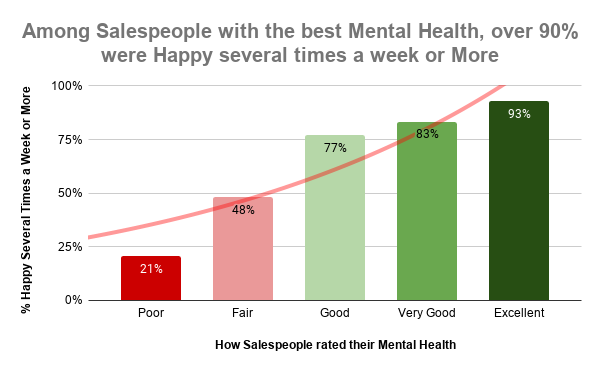
When we look at the Mental Health data based on how frequently salespeople were Happy – the results were equally positive.
Salespeople who described themselves as Happy at work Everyday were 3x more likely to rate their Mental Health as Very Good or Excellent, compared to those who were happy less frequently.
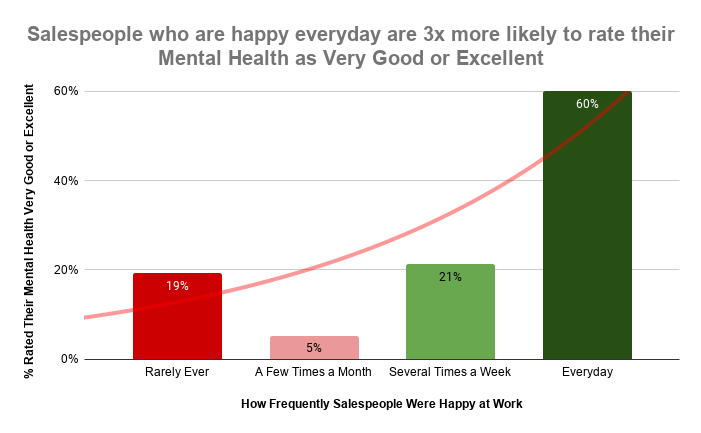
This data should resolve any doubt about prioritizing Happiness and Mental Health in the sales environment. As organizations look for ways to increase engagement, performance and retention, metrics should be built around these variables.
If you’re a sales leader – you’re likely wondering, to what extent does Mental Health and Happiness need to be improved in my sales team?
Massive Opportunity to Improve Sales Performance Through Better Mental Health
Our survey indicated that over 2 in 5 salespeople (43%) struggle with their Mental Health.
Most reputable Mental Health sources state, in any given year 1 in 5 people will experience a mental health problem or illness. Our survey results are more than double the average. This means salespeople could be more than twice as likely to experience declining Mental Health compared to the standard workforce.
Survey research done by our partner UNCrushed told an even more concerning story. Their data showed 67% of salespeople agree/strongly agree that they are close to currently experiencing burnout.
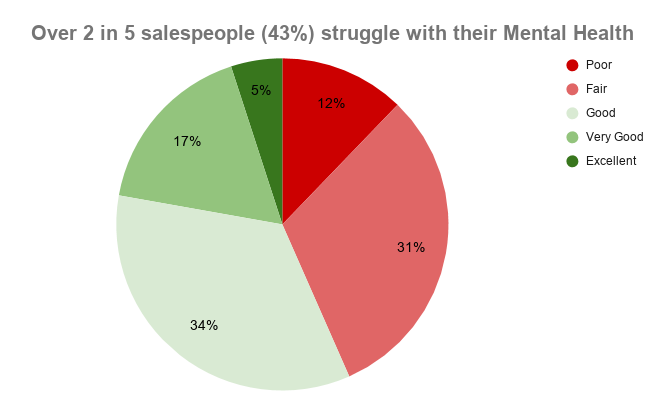
Which Sales Role Struggles the most with Mental Health?
When we analyzed Mental Health by sales role, we found that over half (54%) of SDR/BDRs struggle with their Mental Health. Given the nature of entry-level sales roles and the limited Mental Health support new reps receive, this comes at no surprise. Most fresh college graduates are usually thrown into the deep end and experience a sink or swim environment.
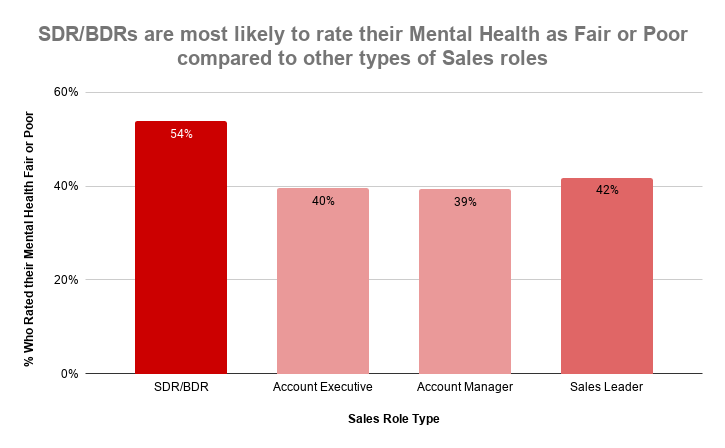
Many think that salespeople “toughen-up” and build mental resilience the longer they work in sales. However, according to our survey data – this is not the case. In fact salespeople appear to struggle the most with their Mental Health early on (0-2 years) and later (Over 10 years) in their career.
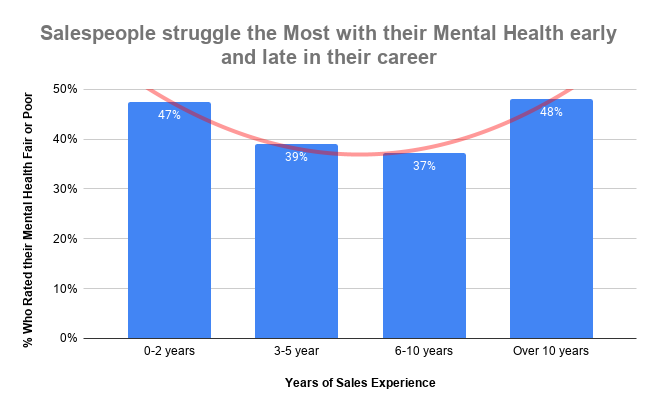
Various explanations could be made about this trend, however it’s likely because salespeople will encounter different Mental Health triggers throughout their career. When you’re new to sales it’s easy to get affected by rejection, challenging targets and deals falling through. As you adjust to working in the sales environment and build confidence, these triggers impact you less.
Later in your career, when you get promoted to leadership you face new Mental Health triggers. Things like managing demotivated salespeople, team conflict and potentially even a mid-life crisis. Deeper triggers that are much harder to address and resolve.
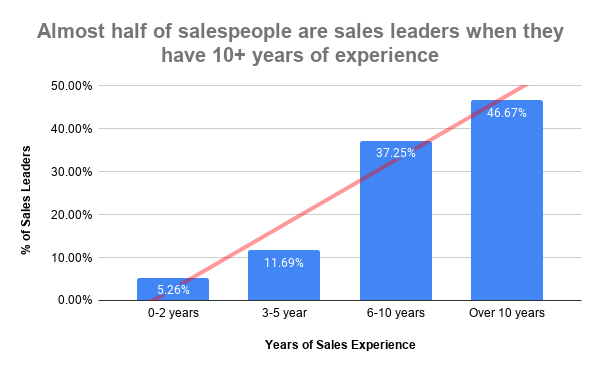
This means supporting salespeople with their Mental Health is needed throughout their entire career. Initially Mental Health and resilience training should help new salespeople adjust to working sales. When they are promoted to leadership, different training should be provided. Training to help them notice, discuss and support their team through challenging Mental Health experiences.
Enjoying This Post? Learn How to Thrive Under Pressure and Hit President’s Club
Improving Happiness in Sales Is Also Extremely Important
Survey data on happiness in sales tells a better story about the well-being of salespeople. The majority of respondents described themselves as happy at work several times a week, but only 14% of salespeople said they are happy everyday.
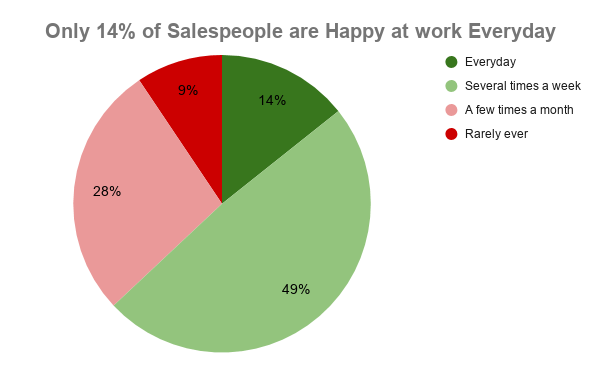
When we analyzed happiness based on years of sales experience, we found a similar trend to Mental Health. Salespeople are happy less frequently early on and late in their careers.
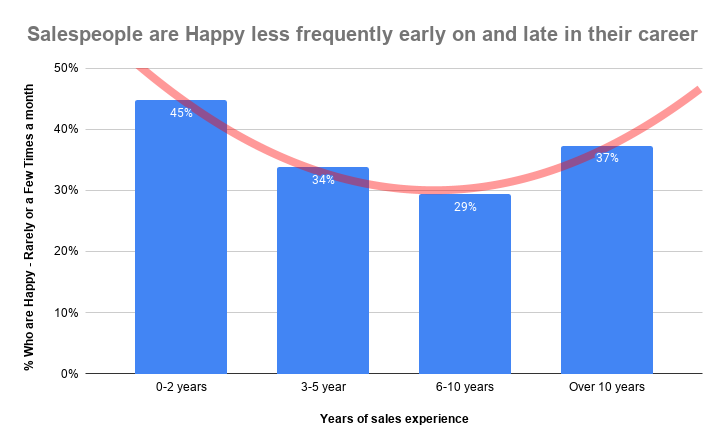
Similar to Mental Health, various explanations could be made about this trend. The sales environment is harsh and stressful. It takes time for new salespeople to adjust to this working environment, which is likely affecting happiness early on.
As we’ll see in the next section, data shows how we perceive our role and whether work is meaningful matters to our happiness. Changing our perspective on work can help salespeople and teams reach higher levels of well-being and performance.
What is Meaningful Work?
Amy Wrzesniewski, a Yale psychologist, has spent her career analyzing how people perceive their work. She found that employees hold one of three primary work orientations that determine how much meaning a person finds in their work.
Within sales, the work orientations are as follows:
Job Orientation: Salespeople with this orientation primarily view their role as a job and find very little meaning in their work. They are working in sales primarily to support their life outside of work. Better performance, means a better life for them and their family.
Career Orientation: Salespeople with this orientation perceive their sales role as a career. They find some meaning in their work and want to do well so they can succeed. They are motivated to sell more if it means they can advance their career through higher salaries and more senior job titles.
Calling Orientation: Salespeople with this orientation primarily view their role as their calling and find a great deal of meaning in their role. They’re working in sales because they are intrinsically motivated by the work rather than the external rewards it provides. As a result, they find meaning, purpose and personal fulfillment through the products they sell and the people they help.
You may be surprised to know that Amy’s research shows the type of job you have does not matter.
Each job type will have approximately equal distributions of each orientation. Her research showed that there are doctors that view their work as job and janitors who view their work as their calling.
The job simply does not matter.
Enjoying This Post? Learn How to Thrive Under Pressure and Hit President’s Club
But what about sales? Does her research hold up?
When we look at sales in general – yes it does. Work orientations were almost equally distributed across the survey respondents; Job (34%), Career (37%), Calling (29%).
However, the distribution becomes less balanced when we begin to look at individual sales role types. Just over half (51%) of sales leaders perceive their work as their Calling, while only 17% of SDR/BDRs find this level of meaning in their work.
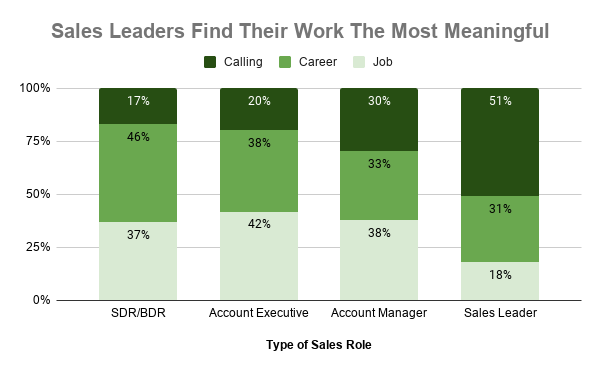
One of the most interesting findings showed up when we looked at the work orientation distribution based on years of experience in sales. Salespeople are often stereotyped as career-driven individuals, but over time this work orientation gets eroded.
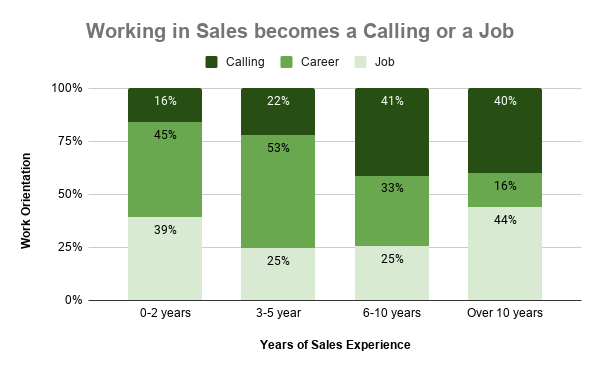
Once you’ve spent more than 10 years in sales, survey data shows you’ll either find your work extremely meaningful or not meaningful at all.
This could be happening for many reasons, but advancing to a sales leadership position at some point during your tenure in sales matters.
The data shows salespeople who advance to a leadership position are likely to find greater meaning in their work. As we already learned, almost half (47%) of salespeople become sales leaders when they have over 10 years of experience.
On the other hand, those who remain individual contributors, are likely to find less meaning in their work. This also makes sense, because many salespeople will likely have married and started a family after 10 years of working experience. Areas in their life that are providing greater meaning than their work in sales.
Now that we understand how work orientations change over time and between sales roles, what does meaningful work do to Mental Health and Happiness?
Meaningful Work & Mental Health
When we look at Mental Health – meaningful work matters.
Looking at the dark green bar, salespeople with a Calling work orientation, were more than twice as likely to rate their Mental Health as very good or excellent, compared to those with a Career orientation.
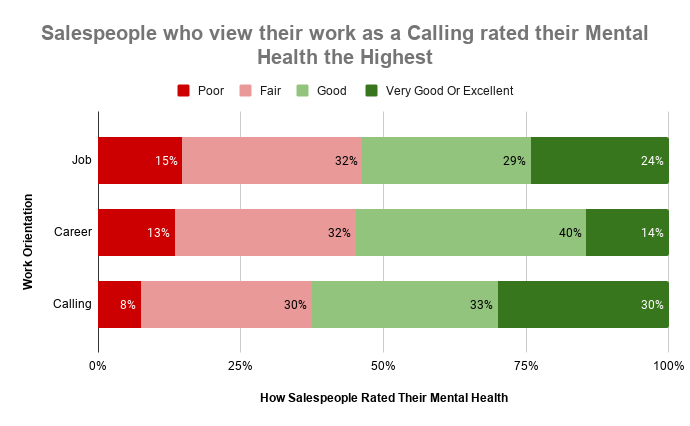
What was surprising to see is salespeople with a Job work orientation also reached peak levels of mental well-being compared to those who view their work as a Career.
Peak levels of Mental Health could be distributed in this way for many reasons. However, variance in goal setting between work orientations likely has something to do with it.
Various studies have shown that feeling in control is extremely important to overall Mental Health when we are in stressful situations. The quickest way to quiet our emotional brain and feel in control is to set short, meaningful and achievable goals. When we set and achieve goals in this way, we engage the logical part of the brain. As a result, we feel in control of the situation.
Setting goals also forces us to make decisions about our future. When we make progress towards them and achieve our goals it releases dopamine in the brain. This neurotransmitter keeps us motivated, increases our well-being and helps suppress anxiety and depression.
Depending on your work orientation, you’ll likely have different types of goals.
Work Orientations & Goal Setting
For example, if you perceive your work as a Job, having control at work doesn’t matter. Your goals surround your life outside of work. As long as work is helping you meet personal goals and financially supporting them, there shouldn’t be a problem. With this orientation, Mental Health challenges arise when you lack personal goals, miss target or compensation changes impacts your lifestyle.
If you perceive your work as a Calling, feeling in control will come more naturally. Every happy customer, positive interaction or peer you help gives you the opportunity to tap your intrinsic goal of helping people. Given the volume of interactions a salesperson has on a daily basis, this means achieving goals is happening consistently and supporting Mental Health.
However, when you have a Career driven orientation, things are different. For example, if you have a goal to “Get promoted to manager” – achieving your goal now becomes dependent on someone else. More importantly, someone else’s perception of you which is extremely difficult to control.
Anyone who has worked in sales knows that the sales environment is often lacking transparency and ripe with carrot holding or company politics. When you set Career goals around advancing up the corporate ladder all of these factors come into play. You no longer have control of your future, because you’ve placed it in the hands of others.
This could also explain why we see salespeople naturally abandon this work orientation later in their careers. For the sake of their Mental Health, viewing their work as a Career no longer makes sense.
To put it bluntly – they’re sick of chasing carrots, only to be disappointed.
Enjoying This Post? Learn How to Thrive Under Pressure and Hit President’s Club
How do the Mentally Healthy perceive their role?
Survey data also helps us look at meaningful work and Mental Health from a different angle. Salespeople with the best Mental Health were also most likely to perceive their sales role as a Calling or Job.
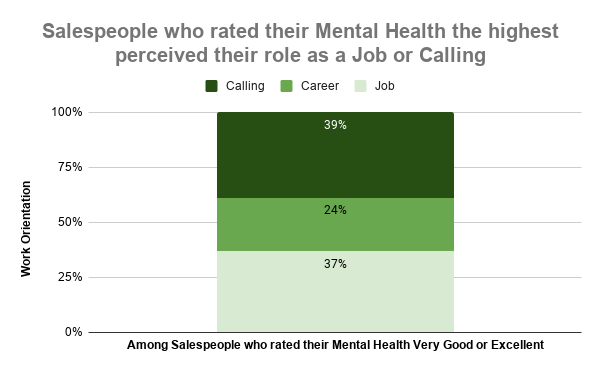
This provides more evidence that something is fundamentally wrong with Career paths within sales. Sales organizations need to do a better job outlining clear ways salespeople can advance. Then stick to them so sales careers can be meaningful. Otherwise, Mental Health and performance will suffer.
If you’re a salesperson, who is looking to get promoted to Manager, it’s in your best interest to adopt a Calling work orientation. Looking for ways to perceive your work as meaningful and intrinsically connecting with what you’re selling is important. Not only will you take better care of your Mental Health, but the data suggests this is the best way to get promoted.
Individual contributors may think adopting a Job work orientation with clear goals outside of work may seem like a decent Mental Health strategy. But as we’ll learn in the next section, without meaningful work, your happiness will suffer and so will sales performance.
Meaningful Work & Happiness
If your goal is to be happy everyday, meaningful work is extremely important.
The data shows salespeople who view their work as a Calling are more likely to be happy every day compared to Career or Job work orientations.
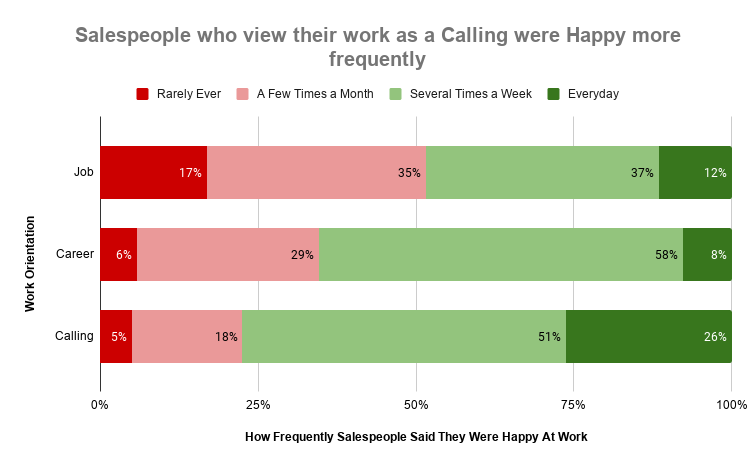
When looking at the data in reverse, the happiest salespeople were also more likely to view their work as extremely meaningful. Salespeople who were happy every day were 2x more likely to have a Calling work orientation.
Analyzing the unhappiest responses – salespeople who were rarely happy at work, were also 4x more likely to perceive their work as a Job.
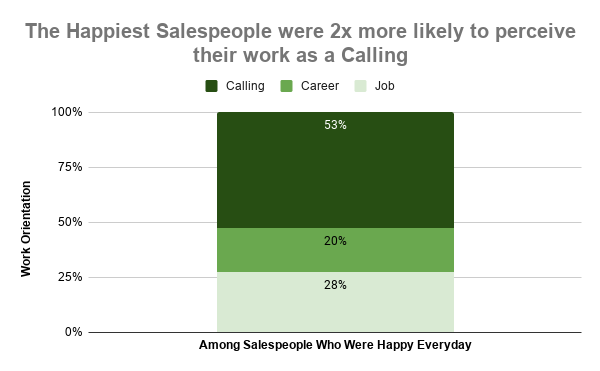
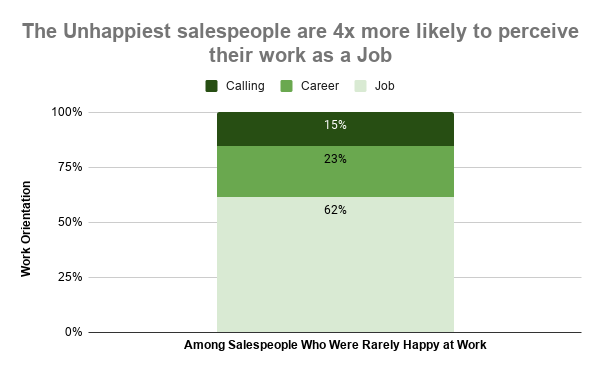
This should come as no surprise. If the average salesperson spends 90,000 hours in their lifetime at work, doing meaningless work will impact your well-being and sales performance.
If you truly want to support a glamorous lifestyle away from the office, your best bet is to change perspective and make work meaningful. This will improve your happiness leading to better Mental Health and bigger commission checks.
Meaningful Work + Mental Health + Happiness = Sales Success
A lot has been discussed around the importance of Mental Health, Happiness and Meaningful work in sales. The main takeaway from the survey results is they are all connected together.
By shifting your perspective to find more meaning in your sales role, you’ll be happier at work more frequently and have better Mental Health. In doing so, your sales performance will increase and you’ll be more resilient to ebbs and flows of sales.
To summarize the other key takeaways from the survey – you can review the results below:
- Salespeople are at higher risk of experiencing declining Mental Health in the workplace. Survey data indicates more than 2 in 5 salespeople (43%) struggle with their Mental Health. More than double the average population.
- SDR/BDRs struggle the most. Over 50% rated their Mental Health as Fair or Poor.
- Salespeople struggle the Most with their Mental Health early and late in their career.
- Only 14% of salespeople describe themselves as Happy every day at work.
- Salespeople are happy less frequently at work early and late in their career.
- Salespeople with the best Mental Health thrive. Over 90% of the described themselves as Happy several times a week or more.
- Salespeople who are happy every day are 3x more likely to rate their Mental Health as Very Good or higher.
- Work Orientations – Job, Career, Calling – are almost equally distributed across salespeople.
- Sales Leaders find their work the most meaningful. Over 50% have the Calling orientation.
- Overtime – working sales becomes extremely meaningful or not at all.
- Salespeople who view their work as meaningful (Calling) rated their Mental Health the highest.
- Those who rated their Mental Health the highest were more likely to have Job or Calling work orientations.
- Salespeople who perceive their sales role as a Career rated their Mental Health the lowest.
- Those who view their work as meaningful were more frequently happy at work.
- Salespeople that were Happy every day were 2x more likely to have a Calling work orientation.
- The unhappiest salespeople were 4x more likely to perceive work as Meaningless.
Next Steps
In closing – individual salespeople and organizations need to find ways to make sales more meaningful and less machine-like. Based on survey data only 29% of the sales community has a Calling work orientation. They are the ones capitalizing on the benefits of intrinsically connecting with the products they sell and clients they help. This attitude and perspective towards sales are making them and the organizations they work for more predictable and more successful.
If you and your organization are now wondering…
What can you do to make sales more meaningful?
How can you change your perspective to make sales less meaningless?
What can you do to build resilience and improve Mental Health in sales?
The Sales Health Alliance can help.
The Sales Health Alliance offers corporate workshops and consulting services that will help transform your sales environment into a more meaningful, happy and supportive Mental Health workplace.
You can check out the programs we offer by clicking the link below.
Learn How to Thrive Under Pressure and Hit President’s Club
About the Author
 Jeff Riseley is currently the Founder of the Sales Health Alliance and Mental Health Advocate. With over a decade of sales experience – Jeff understands the importance of Mental Health in achieving peak sales performance.
Jeff Riseley is currently the Founder of the Sales Health Alliance and Mental Health Advocate. With over a decade of sales experience – Jeff understands the importance of Mental Health in achieving peak sales performance.
Jeff combines his sales (Sales Knowledge Institute) and Mental Health expertise to improve sales performance through a mix of sales mentorship and mental health best practices. His strategies have helped sales teams improve their sales process, while helping them become more motivated, resilient and better equipped to tackle stressful events within sales.
He is currently delivering these strategies through on-site workshops, consulting and speaking engagements. To explore working with Jeff contact him at [email protected]





41 Comments
Pingback: Share Your Mental Health Story - Sales Health Alliance
Pingback: Toxicity, Burnout & The Sales Floor - Submitted By Anonymous - Sales Health Alliance
Pingback: Sales and Mental Health: What can leaders do to make things better?
Pingback: The Greatest Competitive Advantage You’ll Ever Know: Mental Health - Sales Health Alliance
Pingback: The Mental Health Cost Of Your Sales Team - Sales Health Alliance
Pingback: Testimonial: Improve Mental Health in Sales - Sales Health Alliance
Pingback: Online Training: Improve Mental Health in Sales - Sales Health Alliance
Pingback: Sales Leader Mental Health Responsibilities During COVID-19 - Sales Health Alliance
Pingback: Support Mental Health By Responding To Good News In Sales - Sales Health Alliance
Pingback: Why Workplace Mental Health in Sales Is Important? - Sales Health Alliance
Pingback: Mental Health Podcast: Managing Stress in Sales - Sales Health Alliance
Pingback: How To Motivate Sales Reps With Meaningful Work - Sales Health Alliance
Pingback: Promoting Positive Mental Health in a Sales Team - Sales Health Alliance
Pingback: What is Burnout and How to Breakthrough it? - Sales Health Alliance
Pingback: How a Sovos Corporate Account Executive Manages Mental Health in Sales - Sales Health Alliance
Pingback: How the Sales for Startups Founder Manages Mental Health in Sales - Sales Health Alliance
Pingback: How the VEND Director of Sales Manages Mental Health in Sales - Sales Health Alliance
Pingback: How the Founded Sales & Customer Success Lead Manages Mental Health in Sales - Sales Health Alliance
Pingback: Going to Therapy While Working in Sales - Sales Health Alliance
Pingback: Mental Health in Sales Podcast - Sales Health Alliance
Pingback: How a MultiView Senior Business Development Executive Manages Mental Health in Sales - Sales Health Alliance
Pingback: How an American Express Business Development Executive Manages Mental Health in Sales - Sales Health Alliance
Pingback: How the Sweet Leads Founder Manages Mental Health in Sales - Sales Health Alliance
Pingback: How a Bureau Founding Partner Manages Mental Health in Sales - Sales Health Alliance
Pingback: How My Lifelong Struggle With Depression Became My Superpower - Sales Health Alliance
Pingback: What is Anxiety in Sales? - Sales Health Alliance
Pingback: Why Napping At Work Makes You a Better Seller - Sales Health Alliance
Pingback: Drinking in Sales: Learning from Our Drinking Habit - Sales Health Alliance
Pingback: Buyer Ghosting Impacts Mental Health in Sales - Sales Health Alliance
Pingback: Mental Health for Salespeople: A Topic that Needs a Discussion - Sales Health Alliance
Pingback: 9 High Sales IQ Tips to Bolster Motivation - Sales Health Alliance
Pingback: Abusive Coaching: It Happens in Sales, Too - Sales Health Alliance
Pingback: The Sales Enablement Of Well-Being - Sales Health Alliance
Pingback: Podcast: Overcoming Anxiety in Sales - Sales Health Alliance
Pingback: Dealing With Stress in Sales: 6-Point Guide - Sales Health Alliance
Pingback: The Dangers Of Going Back To The Office - Sales Health Alliance
Pingback: What Super Mario Can Teach Sales - Sales Health Alliance
Pingback: Assisting sellers struggling with mental health - ZA AFFILIATES
Pingback: The inescapable link between wellbeing and performance | David Forman
Pingback: 5 Stress Management Strategies in Sales - Sales Health Alliance
Pingback: Hit Sales Target Through Optimal Mental Health - Sales Health Alliance